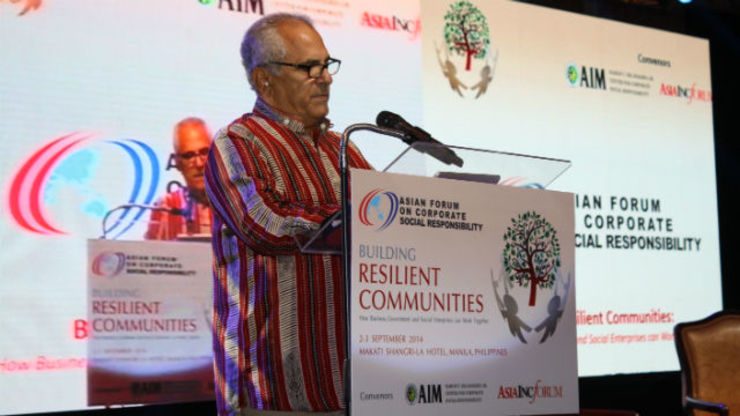SUMMARY
This is AI generated summarization, which may have errors. For context, always refer to the full article.

MANILA, Philippines – Nobel Peace Prize laureate Dr. Jose Ramos-Horta led the opening of the 13th Asian Forum on Corporate Social Responsibility (AFCSR), with the theme “Building Resilient Communities: How Business, Government, and Social Enterprises Can Work Together,” at the Makati Shangri-La Hotel.
In his keynote speech, Dr. Ramos-Horta drew on his experiences in upholding Timor-Leste’s democracy to develop resilience. “Geography, history, and our individual and community experiences mold us into who we are. Communities living in fragile countries and regions that, for centuries, have had to struggle to simply survive, and in some cases prosper, are the best examples of resilience,” he pointed out.
“Resilience stems from adversity, whether natural or man-made, where communities learned to manage what nature does or does not provide,” he continued. “This is the experience for hundreds of years of indigenous peoples all over the world, and we have much to learn from these peoples and their wisdom.”
Dr. Ramos-Horta further emphasized, “We have learned that to be developed, a community ought to live in peace, feel safe, and enjoy political stability. However, long-lasting peace, stability, and security can only be attained through dialogue, listening, political inclusiveness, social innovation, and fostering partnerships and coalitions between government, civil society, communities, and the domestic and international private sectors.”
Good Governance and national resilience
The former President of Timor-Leste’s thoughts were built on by Senator Grace Poe, who discussed the importance of good governance in building national resilience. She cited the case of the local government of San Francisco in the Camotes Island, which suffered zero casualties during Typhoon Yolanda, as a result of being organized right down to the purok level.
“The element of trust is very important in disaster management,” Sen. Poe noted, explaining that in the case of San Fernando, its citizens placed their trust in their community leaders, who were fully prepared to deal with the situation. “Good governance not only leads to economic growth. Good governance can truly save lives,” she stated.
Sen. Poe also highlighted the need for food security. “There can be no national resilience without food security. No nation can claim to be resilient if it cannot feed its population properly,” she stated. “We cannot have a productive workforce if they are not properly nourished.”
When asked what else is needed to build on current reforms, Sen. Poe noted the need to pass the Freedom of Information bill. “It is one way to track the wealth of officials, and it forces us to archive our systems. We don’t have a good tradition of archiving. It will compel government agencies to keep their records properly, and it also keeps people vigilant and focused on the issues.”
Rebuilding from disasters
Speakers from the Philippines, Indonesia, and Myanmar also shared their experiences in rebuilding from disasters and the lessons learned.
Daw Lahpai Seng Raw, Founder of the Metta Development Foundation in Myanmar, a country that saw Cyclone Nargis leaving two million people desolate, remarked, “We have come to terms with how crucial strengthening the community and civil society is. Communities should be engaged from the beginning by the business sector. There should be collaborative efforts among the community, the business sector, and the government.”
Meanwhile, Anton Soedjarwo, Founder and Director of the Yayasan Dian Desa (Light of the Village Foundation), noted that the impact of disasters are not predictable and that there is a need to phase the responses, from emergency to transition to rehabilitation.
“There is a need for a networking hub, where all actors can communicate and help each other better, taking into account each other’s strengths,” he recommended. He also shared that there is a need for those assisting to lessen the showcasing of their efforts. “The real heroes must be the communities affected. They should be the heroes in rebuilding their lives and futures,” he stated.
Lastly, Undersecretary Danilo Antonio of the Office of the Presidential Assistant for Rehabilitation and Recovery, shared that livelihood projects are being screened for sustainability and that these must be activities that the community is willing to pursue. “The most important contribution of the private sector would be sustainable projects and capacity-building,” he said.
The forum’s focus on resilience is reflective of the questions that governments, businesses, social enterprises, and civil society must answer in a world of uncertainty.
“Resilience is particularly relevant for a region like ASEAN, where many communities are vulnerable to natural disasters. Compounding this challenge is the need for inclusive growth,” shared AIM President Steven J. DeKrey. “AIM recognizes that businesses play a critical role in working with governments, social enterprises, and partners on the ground to help address these challenges, and events such as the AFCSR are a venue to gather like-minded leaders and managers who are up to the challenge of solving the region’s most pressing concerns.”
“Of all the qualities that are required to survive and prosper in an unpredictable world, what could be more important than resilience?” asked Dato Timothy Ong, Chairman of AFCSR and Asia Inc. Forum. “How are resilient communities built? How can governments and enterprises work together? Is CSR primarily for economic growth or for something else?”
Attended by over 500 delegates from more than 30 countries worldwide, the event is co-organized by the Asian Institute of Management – Ramon V. del Rosario Sr. Center for Corporate Social Responsibility (AIM-RVR CSR Center) and the Asia Inc. Forum. – Rappler.com
Add a comment
How does this make you feel?
There are no comments yet. Add your comment to start the conversation.